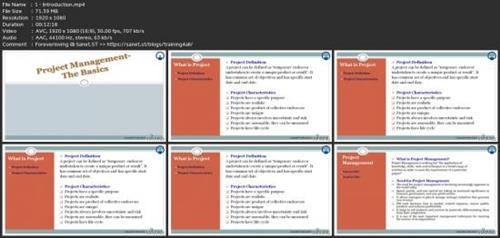- Thread Starter
- #1
Project Management: Process Groups | Knowledge Areas

Master the essentials of project management, from process groups to knowledge areas, for effective project delivery!
What you'll learn
The fundamentals of project management, including its life cycle and phases.
An in-depth understanding of the five Process Groups and ten Knowledge Areas.
How to effectively manage project scope, cost, quality, and communication.
Techniques for risk identification, stakeholder management, and team leadership.
The role of project integration in aligning project objectives with business strategies.
Key strategies for managing the triple constraints of scope, time, and cost.
Requirements
No prior experience in project management is required. A basic understanding of business operations is helpful but not mandatory. Ideal for those looking to gain a formal understanding of project management concepts.
Description
Project management is a critical skill for anyone looking to successfully lead projects in today's fast-paced business environment. This course, Foundations of Project Management, provides a comprehensive introduction to the core concepts, methodologies, and best practices essential for managing projects efficiently. Whether you are new to project management or looking to formalize your knowledge, this course will guide you through the essential elements of project planning, execution, and control.Section 1: IntroductionWe kick off the course with a broad overview of project management, focusing on its importance in achieving organizational goals. This section sets the stage by explaining what project management is, its purpose, and how it differs from regular operational work. It serves as a foundation for understanding the more complex topics that follow.Section 2: Project Management FundamentalsIn this section, we delve into the key characteristics of project management, exploring what makes it unique and essential in various industries. You'll learn about the project life cycle and its phases, which include initiating, planning, executing, monitoring, controlling, and closing projects. This section emphasizes the importance of aligning projects with strategic objectives to drive value.Section 3: Process Groups & Knowledge AreasUnderstanding the structure of project management is crucial for efficient execution. This section introduces you to the five Process Groups: Initiating, Planning, Executing, Monitoring & Controlling, and Closing. We also explore the ten Knowledge Areas, which encompass various project management elements such as scope, time, cost, quality, risk, and stakeholder management. You'll gain insights into how these process groups and knowledge areas interact to create a cohesive project management framework.Section 4: Exploring Key Knowledge AreasIn this deeper dive, we examine specific knowledge areas that are critical to project success roject Integration Management: Ensuring that all project components are effectively coordinated.Scope Management: Defining what is included in the project to meet stakeholders' needs.Cost and Quality Management: Balancing the budget while ensuring the deliverables meet quality standards.Triple Constraints & Communications: Managing the project constraints (scope, time, cost) while ensuring effective communication among stakeholders.Risk and Procurement Management: Identifying potential risks and planning for procurement to avoid project delays.Stakeholder and Human Resource Management: Managing stakeholder expectations and optimizing team performance to achieve project goals.This section is designed to equip you with a holistic understanding of the interconnected elements that influence project success.Conclusion:By the end of this course, you will have a strong foundation in project management principles, enabling you to approach projects with confidence and clarity. You'll be adept at navigating the process groups and knowledge areas, ensuring that your projects are aligned with organizational goals and delivered on time, within budget, and to the satisfaction of all stakeholders.
roject Integration Management: Ensuring that all project components are effectively coordinated.Scope Management: Defining what is included in the project to meet stakeholders' needs.Cost and Quality Management: Balancing the budget while ensuring the deliverables meet quality standards.Triple Constraints & Communications: Managing the project constraints (scope, time, cost) while ensuring effective communication among stakeholders.Risk and Procurement Management: Identifying potential risks and planning for procurement to avoid project delays.Stakeholder and Human Resource Management: Managing stakeholder expectations and optimizing team performance to achieve project goals.This section is designed to equip you with a holistic understanding of the interconnected elements that influence project success.Conclusion:By the end of this course, you will have a strong foundation in project management principles, enabling you to approach projects with confidence and clarity. You'll be adept at navigating the process groups and knowledge areas, ensuring that your projects are aligned with organizational goals and delivered on time, within budget, and to the satisfaction of all stakeholders.
Overview
Section 1: Introduction
Lecture 1 Introduction
Section 2: Project Management
Lecture 2 Project Management Characteristics
Lecture 3 Project Management Life Cycle and Phases
Section 3: Process Groups & Knowledge Areas
Lecture 4 Process Groups & Knowledge Areas
Lecture 5 Different Process Groups
Lecture 6 Different Process Groups & Knowledge Areas
Lecture 7 Project Integration Management
Lecture 8 Scope
Lecture 9 Cost and Quality
Lecture 10 Cost and Quality Continues
Lecture 11 Triple Constraints & Communications
Lecture 12 Tripple Constraints and Communications
Lecture 13 Risk Management
Lecture 14 Procurement Management
Lecture 15 Stakeholder Management
Lecture 16 Stake Holder Management Continues
Lecture 17 Project Human resource Management
Lecture 18 Human Resource Management Continues
Aspiring Project Managers wanting to build a solid foundation in project management.,Current Project Managers looking to formalize and expand their knowledge.,Team Leads and Coordinators who manage project activities.,Business Analysts and Consultants aiming to understand project management frameworks.,Professionals in Any Industry interested in improving project delivery and management.,Students and Graduates looking to start a career in project management.

Say "Thank You"
rapidgator.net:
k2s.cc:

Published 11/2024
MP4 | Video: h264, 1920x1080 | Audio: AAC, 44.1 KHz
Language: English | Size: 1.77 GB | Duration: 2h 30m
MP4 | Video: h264, 1920x1080 | Audio: AAC, 44.1 KHz
Language: English | Size: 1.77 GB | Duration: 2h 30m
Master the essentials of project management, from process groups to knowledge areas, for effective project delivery!
What you'll learn
The fundamentals of project management, including its life cycle and phases.
An in-depth understanding of the five Process Groups and ten Knowledge Areas.
How to effectively manage project scope, cost, quality, and communication.
Techniques for risk identification, stakeholder management, and team leadership.
The role of project integration in aligning project objectives with business strategies.
Key strategies for managing the triple constraints of scope, time, and cost.
Requirements
No prior experience in project management is required. A basic understanding of business operations is helpful but not mandatory. Ideal for those looking to gain a formal understanding of project management concepts.
Description
Project management is a critical skill for anyone looking to successfully lead projects in today's fast-paced business environment. This course, Foundations of Project Management, provides a comprehensive introduction to the core concepts, methodologies, and best practices essential for managing projects efficiently. Whether you are new to project management or looking to formalize your knowledge, this course will guide you through the essential elements of project planning, execution, and control.Section 1: IntroductionWe kick off the course with a broad overview of project management, focusing on its importance in achieving organizational goals. This section sets the stage by explaining what project management is, its purpose, and how it differs from regular operational work. It serves as a foundation for understanding the more complex topics that follow.Section 2: Project Management FundamentalsIn this section, we delve into the key characteristics of project management, exploring what makes it unique and essential in various industries. You'll learn about the project life cycle and its phases, which include initiating, planning, executing, monitoring, controlling, and closing projects. This section emphasizes the importance of aligning projects with strategic objectives to drive value.Section 3: Process Groups & Knowledge AreasUnderstanding the structure of project management is crucial for efficient execution. This section introduces you to the five Process Groups: Initiating, Planning, Executing, Monitoring & Controlling, and Closing. We also explore the ten Knowledge Areas, which encompass various project management elements such as scope, time, cost, quality, risk, and stakeholder management. You'll gain insights into how these process groups and knowledge areas interact to create a cohesive project management framework.Section 4: Exploring Key Knowledge AreasIn this deeper dive, we examine specific knowledge areas that are critical to project success
Overview
Section 1: Introduction
Lecture 1 Introduction
Section 2: Project Management
Lecture 2 Project Management Characteristics
Lecture 3 Project Management Life Cycle and Phases
Section 3: Process Groups & Knowledge Areas
Lecture 4 Process Groups & Knowledge Areas
Lecture 5 Different Process Groups
Lecture 6 Different Process Groups & Knowledge Areas
Lecture 7 Project Integration Management
Lecture 8 Scope
Lecture 9 Cost and Quality
Lecture 10 Cost and Quality Continues
Lecture 11 Triple Constraints & Communications
Lecture 12 Tripple Constraints and Communications
Lecture 13 Risk Management
Lecture 14 Procurement Management
Lecture 15 Stakeholder Management
Lecture 16 Stake Holder Management Continues
Lecture 17 Project Human resource Management
Lecture 18 Human Resource Management Continues
Aspiring Project Managers wanting to build a solid foundation in project management.,Current Project Managers looking to formalize and expand their knowledge.,Team Leads and Coordinators who manage project activities.,Business Analysts and Consultants aiming to understand project management frameworks.,Professionals in Any Industry interested in improving project delivery and management.,Students and Graduates looking to start a career in project management.
Screenshots

Say "Thank You"
rapidgator.net:
You must reply in thread to view hidden text.
k2s.cc:
You must reply in thread to view hidden text.
